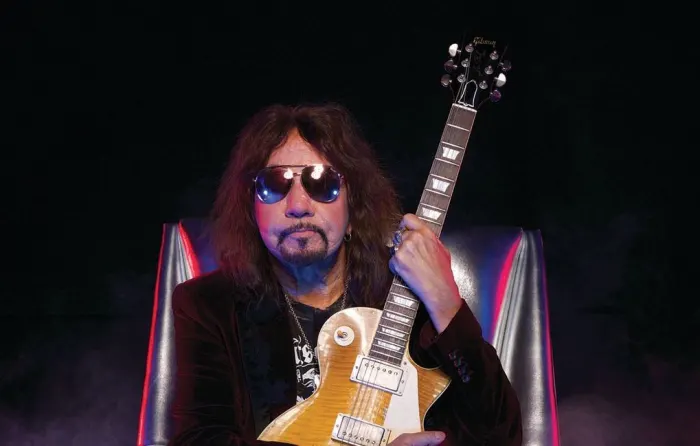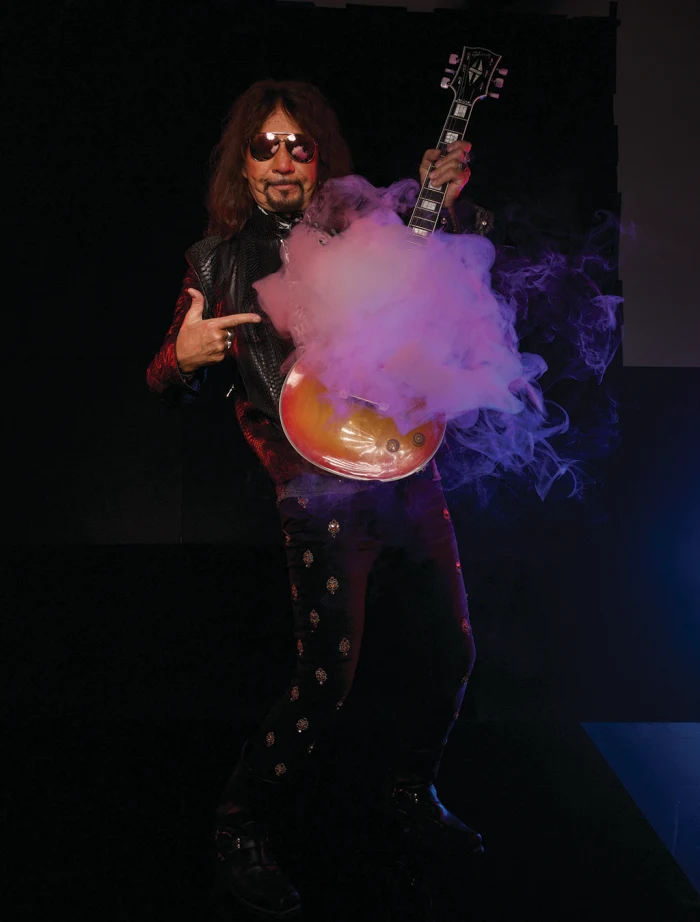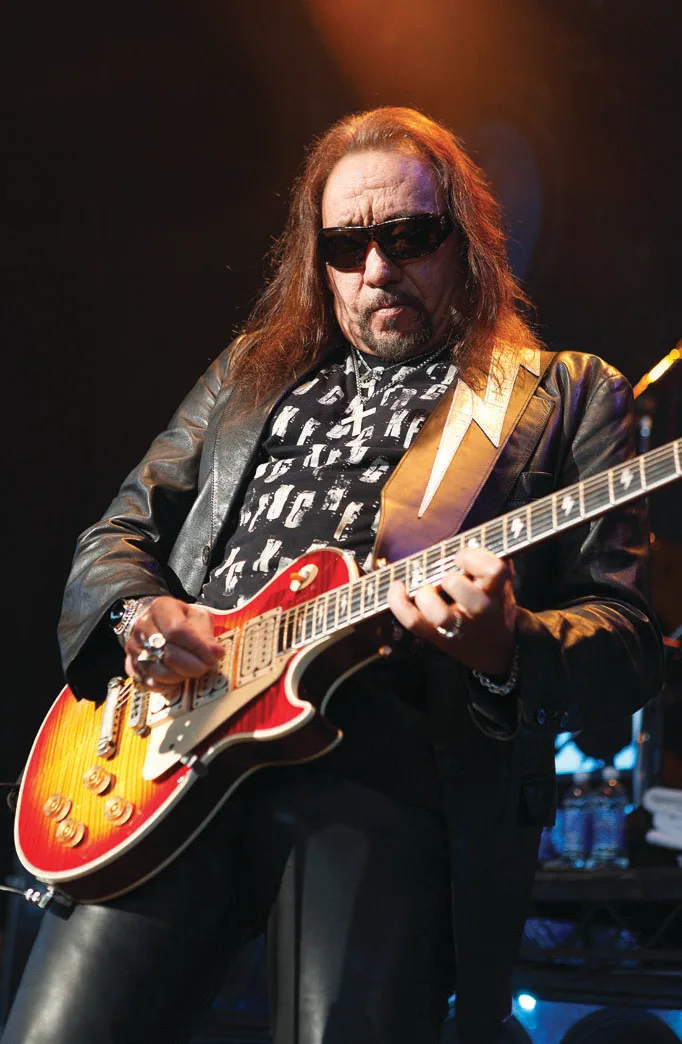Ace Frehley Talks Riffs, Recording and His Improbable Reunion with Gene Simmons on 'Spaceman'
The Kiss guitar hero details his approach to the guitar and his studio secrets.

It’s taken the better part of 40 years, but Ace Frehley has finally come to terms with his stature as a guitar hero. “People say to me all the time, ‘You’re the greatest guitar player ever,’” he says matter of factly. “Or, ‘I picked up the guitar because of you.’ I get that one a lot. It’s weird, because I always looked at guitar playing as my job. Even when Kiss was at its height of popularity, I couldn’t take the acclaim seriously. It made me feel guilty, like I was pulling the wool over people’s eyes. I just did what I did, and things worked out.”
Notable guitarists who have dissected his licks over the years include Dimebag Darrell, Slash, Mike McCready and John 5, to mention a few. When reminded of this, Frehley lets out a laugh. “I guess they just liked good riffs, same as anybody else. You take something like ‘Cold Gin,’” he says, referring to his classic Kiss-era tune. “It’s a catchy riff in a catchy song. There wasn’t a science behind it. I wish there was, then I’d write a lot more of them.” Frehley applies his blissfully instinctive approach to riffology throughout his newly released eighth solo album, Spaceman, on which the 67-year-old Bronx-born guitarist blitzes his way through a robust collection of gutsy originals, such as “Rockin’ with the Boys,” “Mission to Mars” and “Pursuit of Rock and Roll.” The album’s other highlights include a ripping take on Eddie Money’s soul-pop gem “I Wanna Go Back,” and two stomping tunes Frehley penned with his old Kiss mate Gene Simmons: “Without You I’m Nothing” and “Your Wish Is My Command.” Though there was bad blood between the two men for years, they’ve been on good terms as of late. In addition to making musical contributions, Simmons suggested Frehley name the new album for his former Kiss “Spaceman” persona.
“It was pretty easy working with Gene,” Frehley notes. “I called him up and said, ‘Do you want to write something for my new album?’ And he said, ‘Sure.’ He came to my house, and we wrote two songs. Gene came up with the basic riffs, and then I wrote the words and restructured the arrangements. After all these years, things are sort of the same between us.”
You left Kiss when the band was still an enormously popular outfit. Any regrets?
No, not at all. Everything got to be too much. I felt like I lost my identity. I had some alcohol and substance abuse problems, and I wasn’t playing the guitar anymore. I had to rediscover who I was, and I had to reacquaint myself with the guitar. Once I got my health back, my love affair with the guitar came back hotter than ever.
Is making records as exciting as it was back in the ’70s? So much about the music business has changed.
We definitely had the best of it. We made records, and they sold like crazy. Since I started, we went from records to eight-tracks to cassettes to CDs and then DVDs. Now people hear music on the Internet. Yeah, we had it made back then. I just found out that Best Buy doesn’t even carry CDs anymore. That surprised me a bit.
What’s your process for recording an album? Do you simply collect a batch of songs, or is it a more formal undertaking?
I don’t have a formal process for anything. [laughs] I can’t force myself to write — I have to be inspired. Gene Simmons used to tell me that he wrote a song a day, but you know, he’s a very disciplined guy. I can’t do that. I’ll play around and see if a riff hits me. If it does, I’ll work on it. If it doesn’t, I’ll wait till the next one comes.
What did you learn about recording guitars from producers Eddie Kramer and Bob Ezrin? Anything you still apply to your own records?
I do everything now at home in my studio in San Diego. I’ve produced my last three albums in five years, and I couldn’t have done it without those guys showing me the ropes. They showed me how to mic guitars and how to use preamps. I put two mics on a cabinet — usually an SM57 and a ribbon mic — and I blend them. The placement of a mic near a cabinet makes all the difference in how a guitar sounds. A lot of people don’t realize that.

In the studio, do you still stack a lot of guitar tracks for your rhythm sound? A lot of guitarists think that fewer guitars makes them stand out more.
Oh, yeah. I stack ’em high. I like layers and layers of Gibsons and Fenders. That’s how I get my fat sound. I’ll record one track with a Les Paul and then put a Tele on top. Usually I have six guitars on a rhythm track. I also put acoustics behind the electrics. I learned that from Pete Townshend.
He told you how to do that?
No, I can hear it! [laughs] I listened to the records.
Let’s talk about some of the new tracks. “Bronx Boy” has a pretty crazy riff. Do you always write riffs first?
It varies. I just play what feels good.
Your solo on “I Wanna Go Back” sounds structured in parts and improvised in others. Do you have a bit of an idea of what you want to play in a solo?
All of my solos are improvised. There isn’t one recent solo that I’ve planned out. I usually have my engineer record half a dozen solos, and then we piece them together. Sometimes I’ve made demos of solos, but I always wound up changing them to something different. I can’t read music, so I just do things as I do them.
What were the main guitars for the album? I assume a generous amount of Les Pauls.
A lot of Les Pauls, a lot of Fenders and a lot of acoustics. Gibson did a ’59 Les Paul reissue, and I’ve been playing that one a lot. Then I’ve got a bunch of Teles and Strats, and a lot of old Fender tweed amps. I use Marshalls — whatever I have sitting around. I just got a new Marshall at a pawnshop. It’s a solid-state, but it sounds great. A lot of people don’t like solid-state amps, but this one sounds good to me.
Any new effect pedals?
I don’t use pedals. I don’t like them onstage because I trip over them. If I want some reverb or delay, I add that later. I play pretty much clean. I’ll use plug-ins when I record, but that’s after the fact.

I recently watched a clip on YouTube of Kiss on The Tomorrow Show with Tom Snyder from 1979. You were cracking Tom up, but it looked like Gene was kind of mad at you.
I was kind of loaded for that show. It was live television, so there wasn’t much they could do. I felt a little bit of animosity from Gene and Paul [Stanley], but halfway through they realized that they couldn’t win, so they joined in with me. That’s when they started telling stories about me to Tom. [laughs]
Okay, the question everybody wants to know is… Will there be another Kiss reunion with the original band?
I don’t know. You’ll have to ask Gene and Paul about that. I haven’t been asked to do anything.
If you were asked, would you be up for reuniting the band?
Yeah, if the price was right. [laughs]
Last question! Is there anything on the guitar you want to do but still haven’t?
In guitar design, yeah. I have a couple of new ideas for special-effects guitars. I invented the smoking guitar, the rocket guitar and the light guitar. I have a few other guitar ideas, but I can’t disclose what they are.
Not even a little hint?
I can’t say anything. I see them in my head, but I need to work on them and make ’em real.
Get The Pick Newsletter
All the latest guitar news, interviews, lessons, reviews, deals and more, direct to your inbox!
Guitar Player is the world’s most comprehensive, trusted and insightful guitar publication for passionate guitarists and active musicians of all ages. Guitar Player magazine is published 13 times a year in print and digital formats. The magazine was established in 1967 and is the world's oldest guitar magazine. When "Guitar Player Staff" is credited as the author, it's usually because more than one author on the team has created the story.
“We’d heard Jimi Hendrix, we'd heard the Who, but now we finally got to see these guys. And watching Jimi Hendrix burn his guitar….” Grace Slick on Hendrix at Monterey, Jefferson Airplane and the Spanish origins of “White Rabbit”
“I’m still playing but I’m covered in blood. Billy’s looking at me like, ‘Yeah! That’s punk rock!'” Steve Stevens on his all-time worst gig with Billy Idol — and the visit to Jimi Hendrix's grave that never happened









